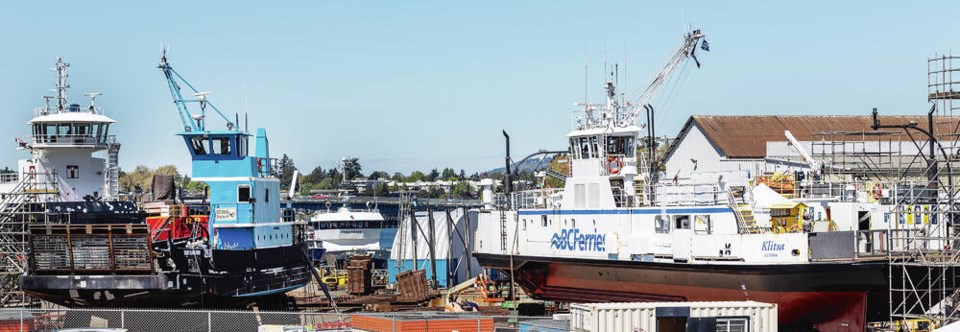B.C. Ferries has issued a notice that it intends to split drydocking and repair services for its fleet between three B.C. shipyards.
The plan is for the majority of work to go to Victoria’s Point Hope Maritime Ltd., at 46 per cent, and Seaspan ULC, also at 46 per cent. Seaspan owns 91ԭ�� Shipyards and has its own drydock in North 91ԭ�� and owns Victoria Shipyards. Various companies rent the huge federal Esquimalt Graving Dock.
91ԭ��’s Allied Shipbuilders Ltd. which has two floating drydocks, would receive eight per cent of the work.
B.C. Ferries estimates the total value of drydocking work will be at $14.5 million per year for the next five years.
Contracts, called master service agreements, would be for five years, with the option to extend for up to 10 years, said B.C. Ferries spokesman Jeff Groot.
The aim is for contracts to begin in the second quarter of this year.
Work would be “bundled” into contracts. B.C. Ferries normally awards individual contracts when vessels need to go into drydock but, about five years ago, it bundled seven vessels to Point Hope Maritime.
Both Point Hope and Seaspan will work on minor, intermediate and large vessels. Allied will work on minor and intermediate-sized vessels.
Work includes drydocking and repairs, modifications, and refits for the B.C. Ferries’ 38 vessels.
Routine maintenance requirements for the ferries are planned on a 10-year schedule. Emergency repairs will be carried out as needed.
By moving to the bundling model, B.C. Ferries expects it will reduce cost and time leading to more efficiencies and improved long-range planning for the company and the shipyards.
Moving to these long-term relationships with shipyards will promote collaborative risk management, quality management, performance management, and continuous improvement, the company said.
B.C. Ferries also expects stability will result in booking drydock space as vessel repair schedules are established.
Drydocks are similar to a giant bathtub. Vessels are floated in and placed on supports. Water is then removed from the area, giving workers the ability to work on the ship.
B.C. Ferries said in its notice that its bundling approach will reduce the risk of industry concentration by ensuring a long-term, sustainable and ship repair market for its vessels.



